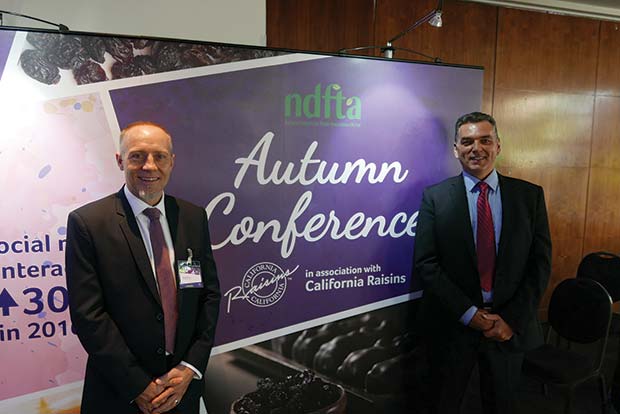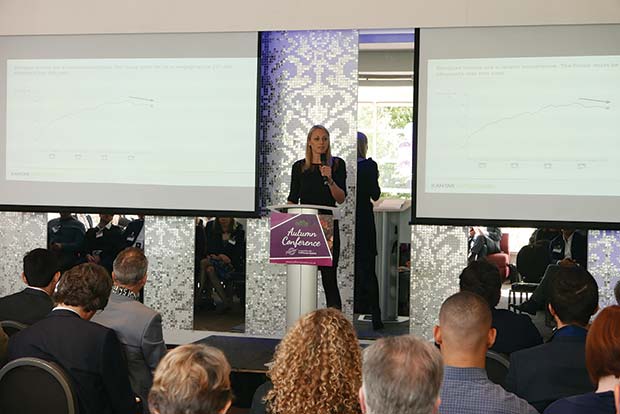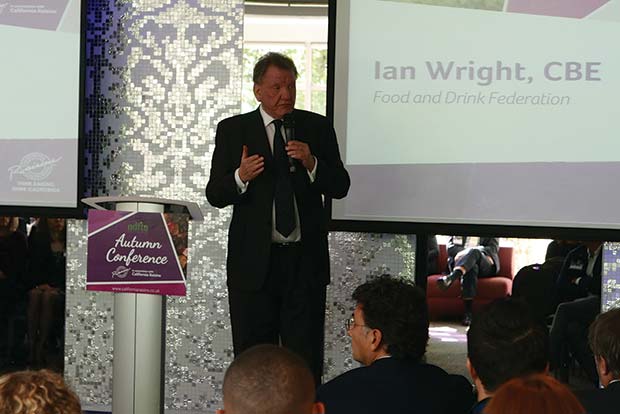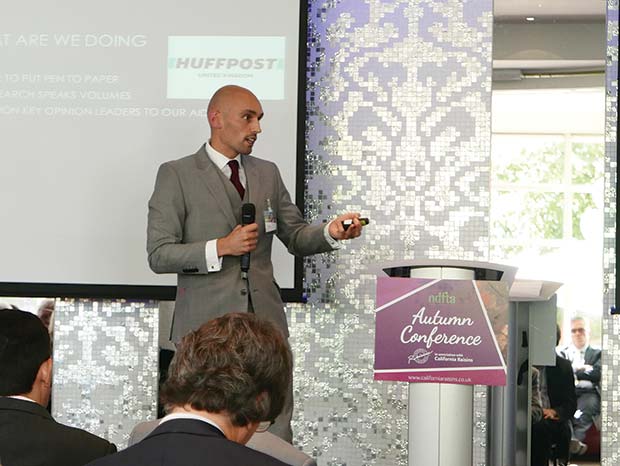In some quarters of the UK media, dried fruit is currently being portrayed as the villain of the piece, with the Daily Mail among others quoting British dentists who allege that raisins are bad for your teeth and worse than sweets. To combat what at times seems like a fake news conspiracy masterminded by the confectionery manufacturers, the world urgently needs to be told the true story, which is in fact a very positive one. That’s the message from last month’s National Dried Fruit Trade Association Conference, held at the Roof Gardens in Kensington.

Supported by California Raisins, the latest two-yearly NDFTA Conference event started with the formal proceedings of the Association’s AGM then moved to a larger room for motivational speeches from the industry’s leading lights. Attendees were largely drawn from food manufacturing, with high level retail guests including Jo Batty, Tesco dried fruit and produce buyer.
Opening the AGM, outgoing NDFTA Chairman Simon Brown, MD of UK fruit importers John Morley, spoke of dried fruit having an ‘interesting’ year, with all the irony that word implied. It faced much the same problems as sugar, with raisins in particular accused of being bad for your teeth. The NDFTA had been highly successful in influencing the UK government, but needed to go further. The UK dried fruit industry was very small in the number of businesses concerned, but had a massive influence on the worldwide dried fruit market, both technically and on the trading side.
The NDFTA have invested in research and come up with a huge amount of evidence-based stories to rescue dried fruit from the ‘sugar is bad’ rogues’ gallery, the latest being the final report from a research study showing that small amounts of raisins and dried fruit can in fact control blood sugar levels. Some reports suggested the polyphenyls in fruit skins could also have positive effects, and the Association was sending its members a letter asking for support stating the case.

Simon Brown went on to say that dried fruit lagged behind fresh fruit in terms of ‘field to fork’ information. There was more pressure to come to do more in this area from UK retailers and much work to do to get dried fruit’s quality message across to the snacking public. The NDFTA being part of Frucom, the international association, would be very important as the Brexit negotiations went on.
After a change of rooms, Simon Brown opened the main conference, again acknowledging his three years as NDFTA Chairman. As in the AGM, he spoke of the last twelve months being a difficult time, given the major issues with pesticides, but Frucom had been helpful. This year, the NDFTA intended to defend dried fruit from the bad stories about its alleged effect on teeth and focus on the positive story that a handful of raisins can control blood sugar spikes after food.
Incoming NDFTA Chairman Simon Melik, MD of Besana UK, another dried fruit importer, took the stage next. In an upbeat presentation styling himself the ‘Wolf of Walnut,’ he thanked California Raisins for sponsoring the event and called the UK’s dried fruit companies “national treasures,“ before pointing out that Whitworths was in fact now Turkish-owned, his company was Italian, Freeworld was part Scottish and part Sri Lankan and Demos Ciclitira was Greek in origin.

Pausing from a stream of brilliant but unprintable jokes long enough to deliver some serious points, Simon reminded the audience of the hard facts: dried fruit was struggling in the UK, and vine fruit sales were on the slide, a topic Rebecca Henry of Kantar Worldpanel would pick up in her speech later. There were urgent issues to address: Simon came back to the damage done to dried fruit’s image by the attacks on sugar, the reports of pesticide residues and the inevitable effects of Brexit on price stability.
Next up, Peter Meadows, UK/Europe Marketing Director of California Raisins, welcomed the audience to the sixth NDFTA Conference. He spoke passionately about the battle to tell British consumers the truth about dried fruit. Dried fruit was coming under fire as full of concentrated sugar, “worse for your teeth than sweets.”
Peter described coming to work on May 10th this year after the ‘raisins rot teeth’ story broke in the Daily Mail, with its allegations that 24% of UK under 4’s had teeth extracted after eating dried raisins. He pointed out that this was itself ‘rot,’ as in reality 60% of under 4’s had never been to the dentist in the first place. Were the sweet manufacturers colluding in a plot against dried fruit?

There was an urgent need to tackle these issues. The gloves were off, it was time to park the tanks on the Daily Mail’s lawn. There were proper scientific reasons as to why dried fruit was good for you: it was time to build the argument against the myth and target the media, with a strategy including planting positive stories in the consumer press, attending British Dental Association conferences and having dentists fighting dentists to get the truth across. Peter promised there would be a lot more noise to combat this issue.
After the campaigning, it was time for some objective consumer research. Rebecca Henry of Kantar World Panel explained that the total dried fruit market was static but snacking fruit was in growth. It was a smaller shopping base than baking fruit but shoppers were spending more per head, especially on healthy snacking, driven by 16- 34s. Christmas accounted for 31% of the baking category, which despite mega TV shows like Bake Off was showing a longterm downward trend. There was a need to shout about dried fruit’s health benefits and important role in healthy snacking – the vitamins and fibre it contained, its place in our five portions a day of fruit and veg, its lower sugar and salt content and how it was more natural and less processed than other snack foods.
Next up was Ian Wright, Director General of the Food & Drink Federation, the UK’s largest food and drink trade body. Mindful of the strong feelings in the room about the media’s coverage of the “dried fruit rots your teeth” allegations, he admitted to starting his career with Mars and confessed that in 1985 he wrote a press release saying bananas caused more dental caries than a Mars bar – so the food manufacturers had been raising the dust then, too!

Serious once more, Ian Wright said the FDF had been leading the argument on sugar for the last two years. He had had a set-to on Newsnight with Jamie Oliver no less, and was an active campaigner on behalf of the food industry, taking issue with Public Health England over dental cavities and obesity. Over the years to 2020 the industry would be reporting sixmonthly sugar reduction figures, and he warned that the figures would appear worse because the necessary reformulation couldn’t be done quickly. Taking on the health lobbies like this was the right thing to do: it was ridiculous to accuse manufacturers of causing dental caries in four year olds, and in any case the Daily Mail and Daily Star’s articles contradicted each other. Ian Wright devoted the rest of his speech to Brexit, which he said would cause “huge chaos” in British ports in March 2019, as the new customs declaration system would never be ready in time. On top of that 35% of food workers were Europeans. Brexit was a very serious problem, needing clear, speedy action from the Government.
The final speaker was Rick Miller, a clinical dietician retained to lobby on behalf of California Raisins and others. Rick said the recent media furore meant many mums would never give their children raisins. Many healthcare professionals didn’t know the difference between the various sugar sub types, and it ended up being left to “Doctor Daily Mail” to tell consumers what was good for them.
Rick explained that dried fruit was 72% carbohydrate plus fibre, vitamins and minerals, and there were many misconceptions to be addressed. Misconception 1 was that dried fruit is full of fructose, “which leads to diabetes” – you need to eat a kilo of fructose to risk that, but you simply can’t eat that much. Misconception 2 was that dried fruit contained nothing of any nutritional benefit – again, totally wrong! It has more fibre than its fresh counterparts, is abundant in antioxidants and dense in micronutrients and is a natural source of energy. Misconception 3 was the oft-repeated “Dried fruit rots teeth,” which is also totally wrong. Polyphenyls fight bacteria and raisins don’t contain sucrose.
Ending a stirring conference, Rick Miller promised he would be lobbying hard to stop the “raisins are worse for you than crisps” lobby and their British Dental Association supporters in their tracks and get Public Health England to change their ways. You read it here first!
By Charles Smith, Editor,
The Grocery Trader




Comments are closed.